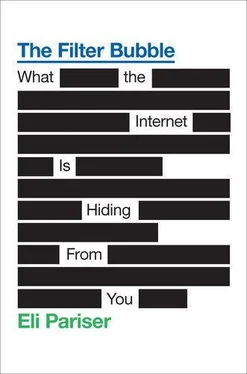72 “Woman in Sumo Wrestler Suit”: Huffington Post, “The Craziest Headline Ever,” June 23, 2010, accessed Dec. 11, 2010, www.huffingtonpost.com/2010/06/23/craziest-bar-ever-discove_n_623447.html.
72 sex with a horse:Danny Westneat, “Horse Sex Story Was Online Hit,” Seattle Times, Dec. 30, 2005, accessed Dec. 11, 2010, http://seattletimes.nwsource.com/html/localnews/2002711400_danny30.html.
72 world’s ugliest dog:Ben Margot, “Rescued Chihuahua Princess Abby Wins World’s Ugliest Dog Contest, Besting Boxer Mix Pabst,” Los Angeles Times, June 27, 2010, accessed Dec. 11, 2010, http://latimesblogs.latimes.com/unleashed/2010/06/rescued-chihuahua-princess-abby-wins-worlds-ugliest-dog-contest-besting-boxer-mix-pabst.html.
72 “everyone sees the same thing”:Carl Bialik, “Look at This Article. It’s One of Our Most Popular,” Wall Street Journal, May 20, 2009.
73 “little need to share marketing information”:Andrew Alexander, “Making the Online Customer King at The Post,” Washington Post, July 11, 2010, accessed Dec. 11, 2010, www.washingtonpost.com/wp-dyn/content/article/2010/07/09/AR2010070903802.html.
73 “whether you want to hear this or not”:Nicholas Negroponte, interview with author, Truckee, CA, Aug. 5, 2010.
73 “Gawker’s Big Board is a scary extreme”:Professor Michael Schudson, interview with author, New York, NY, Aug. 13, 2010.
73 stories about the war in Afghanistan:Simon Dumenco, “Google News Cares More About Facebook, Twitter and Apple Than Iraq, Afghanistan,” Advertising Age , June 23, 2010, accessed Feb. 9, 2011, http://adage.com/mediaworks/article?article_id=144624.
74 “not to pursue some important stories”:Alexander, “Making the Online Customer King.”
75 “periodically be alarmed when there is a crisis?”:Shirky, interviewed by Jay Rosen.
75 “consequences of conjoint and interacting behavior”:John Dewey, The Public and Its Problems (Athens, OH: Swallow Press, 1927), 126.
Chapter Three: The Adderall Society
77 “contact with persons dissimilar to themselves”:John Stuart Mill, The Principles of Political Economy (Amherst, MA: Prometheus Books, 2004), 543.
77 “reminds one more of a sleepwalker’s”:Arthur Koestler, The Sleepwalkers: A History of Man’s Changing Vision of the Universe (New York: Penguin, 1964), 11.
78 “but I don’t want to talk here”:Henry Precht, interview with Ambassador David E. Mark, Foreign Affairs Oral History Project, Association for Diplomatic Studies and Training, July 28, 1989, accessed Dec. 14, 2010, http://memory.loc.gov/service/mss/mssmisc/mfdip/2005%20txt%20files/2004mar02.txt.
78 the two men planned a meeting:Ibid.
78 “all I want is my money”:Ibid.
78 “I was snookered”:John Limond Hart, The CIA’s Russians (Annapolis: Naval Institute Press, 2003), 132.
78 defect and resettle in the United States:Ibid., 135.
79 James Jesus Angleton… was skeptical:Ibid., 140.
79 CIA’s documents indicated otherwise:“Yuri Ivanovich Nosenko, a Soviet defector, Died on August 23rd, Aged 80,” Economist, Sept. 4, 2008, accessed Dec. 14, 2010, www.economist.com/node/12051491.
79 subjected to polygraph tests:Ibid.
80 sent to the Russian front as punishment:Richards J. Heuer Jr., “Nosenko: Five Paths to Judgment,” Studies in Intelligence 31, no. 3 (Fall 1987).
80 set him up in a new identity:David Stout, “Yuri Nosenko, Soviet Spy Who Defected, Dies at 81,” New York Times, Aug. 27, 2008, accessed Dec. 14, 2010, www.nytimes.com/2008/08/28/us/28nosenko.html?scp=1&sq=nosenko&st=cse.
80 news of his death was relayed:Ibid.
81 full of laudatory comments:Richards J. Heuer Jr., Psychology of Intelligence Analysis (Alexandria, VA: Central Intelligence Agency, 1999).
81 “analysts should be self-conscious”:Ibid., xiii.
82 secondhand and in a distorted form:Ibid., xx–xxi.
82 “To achieve the clearest possible image”:Ibid., xxi–xxii.
83 “predictably irrational”:Dan Ariely, Predictably Irrational: The Hidden Forces That Shape Our Decisions (New York: HarperCollins, 2008)
83 figuring out what makes us happy:Dan Gilbert, Stumbling on Happiness (New York: Knopf, 2006).
83 only one part of the story:Kathryn Schulz, Being Wrong: Adventures in the Margin of Error (New York: HarperCollins, 2010).
84 “Information wants to be reduced”:Nassim Nicholas Taleb, The Black Swan: The Impact of the Highly Improbable (New York: Random House, 2007), 64.
85 quickly converted into schemata:Doris Graber, Processing the News: How People Tame the Information Tide (New York: Longman, 1988).
85 “condensation of all features of a story”:Ibid., 161.
85 woman celebrating her birthday:Steven James Breckler, James M. Olson, and Elizabeth Corinne Wiggins, Social Psychology Alive (Belmont, CA: Thomson Wadsworth, 2006), 69.
86 added details to their memories:Graber, Processing the News, 170.
86 Princeton versus Dartmouth:A. H. Hastorf and H. Cantril, “They Saw a Game: A Case Study,” Journal of Abnormal and Social Psychology 49: 129–34.
87 experts’ predictions weren’t even close:Philip E. Tetlock, Expert Political Judgment: How Good Is It? How Can We Know? (Princeton: Princeton University Press, 2005).
88 a process of assimilation and accommodation:Jean Piaget, The Psychology of Intelligence (New York: Routledge & Kegan Paul, 1950).
89 the idea that Obama was a Muslim:Jonathan Chait, “How Republicans Learn That Obama Is Muslim, New Republic, Aug. 27, 2010, www.tnr.com/blog/jonathan-chait/77260/how-republicans-learn-obama-muslim.
89 “actually become mis-educated”:Ibid.
89 two modified versions of “The Country Doctor”:Travis Proulx and Steven J. Heine, “Connections from Kafka: Exposure to Meaning Threats Improves Implicit Learning of an Artificial Grammar,” Psychological Science 20, no. 9 (2009): 1125–31.
90 “A severe snowstorm filled the space”:Franz Kafka, A Country Doctor (Prague: Twisted Spoon Press, 1997).
90 “Once one responds to a false alarm”:Ibid.
90 “strived to make sense”:Proulx and Heine, “Connections from Kafka.”
91 presented with an “information gap”:George Loewenstein, “The Psychology of Curiosity: A Review and Reinterpretation,” Psychological Bulletin 116, no. 1 (1994): 75–98, https://docs.google.com/viewer?url=www.andrew.cmu.edu/user/gl20/GeorgeLoewenstein/Papers_files/pdf/PsychofCuriosity.pdf.
91 “shields the searcher from such radical encounters”:Siva Vaidhyanathan, The Googlization of Everything (Berkeley and Los Angeles: University of California Press, 2011), 182.
91 “only give you answers”:Pablo Picasso, as quoted in Gerd Leonhard, Media Futurist Web site, Dec. 8, 2004, accessed Feb. 9, 2011, www.mediafuturist.com/about.html.
Читать дальше











